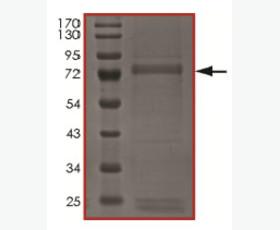Recombinant Human B7-H3/CD276
| Product name: | Recombinant Human B7-H3/CD276 |
| Source: | Human Cells |
| Purity: | Greater than 95% as determined by reducing SDS-PAGE. |
| Buffer Formulation: | Lyophilized from a 0.2 μm filtered solution of PBS, pH 7.4. |
| Applications: | Applications:SDS-PAGE; WB; ELISA; IP. |
| Storage: | Avoid repeated freeze/thaw cycles. Store at 2-8 oC for one month. Aliquot and store at -80 oC for 12 months. |
| UOM: | 100ug/50ug/200ug/1mg/1g |
| Source | Human Cells |
| Description | Recombinant Human B7 Homolog 3 is produced by our Mammalian expression system and the target gene encoding Leu29-Thr461 is expressed with a 6His tag at the C-terminus. |
| Names | CD276, B7H34Ig-B7-H3, B7-H3, B7 homolog 3, CD276 antigen, CD276 molecule, Costimulatory molecule |
| Accession # | Q5ZPR3 |
| Formulation | Lyophilized from a 0.2 μm filtered solution of PBS, pH 7.4. |
| Shipping |
The product is shipped at ambient temperature. |
| Reconstitution |
Always centrifuge tubes before opening. Do not mix by vortex or pipetting. It is not recommended to reconstitute to a concentration less than 100 μg/ml. Dissolve the lyophilized protein in ddH2O. Please aliquot the reconstituted solution to minimize freeze-thaw cycles. |
| Storage |
Lyophilized protein should be stored at < -20°C, though stable at room temperature for 3 weeks. Reconstituted protein solution can be stored at 4-7°C for 2-7 days. Aliquots of reconstituted samples are stable at < -20°C for 3 months. |
| Purity |
Greater than 95% as determined by reducing SDS-PAGE. |
| Endotoxin | Less than 0.1 ng/µg (1 IEU/µg) as determined by LAL test. |
| Amino Acid Sequence |
LEVQVPEDPVVALVGTDATLCCSFSPEPGFSLAQLNLIWQLTDTKQLVHSFAEGQDQGSAYANRT ALFPDLLAQGNASLRLQRVRVADEGSFTCFVSIRDFGSAAVSLQVAAPYSKPSMTLEPNKDLRPG DTVTITCSSYQGYPEAEVFWQDGQGVPLTGNVTTSQMANEQGLFDVHSILRVVLGANGTYSCLVR NPVLQQDAHSSVTITPQRSPTGAVEVQVPEDPVVALVGTDATLRCSFSPEPGFSLAQLNLIWQLT DTKQLVHSFTEGRDQGSAYANRTALFPDLLAQGNASLRLQRVRVADEGSFTCFVSIRDFGSAAVS LQVAAPYSKPSMTLEPNKDLRPGDTVTITCSSYRGYPEAEVFWQDGQGVPLTGNVTTSQMANEQG LFDVHSVLRVVLGANGTYSCLVRNPVLQQDAHGSVTITGQPMTHHHHHH
|
| Background | CD276, also known as B7-H3, is a member of the B7 superfamily with signature IgV and IgG regions in extracellular domains. It is a type I transmembrane protein and shares 20–27% amino acid identity with other B7 family members. B7-H3 is involved in the activation of T lymphocytes, and regulates murine bone formation. It is also reported that B7-H3 may play an important role in muscle-immune interactions, providing further evidence of the active role of muscle cells in local immunoregulatory processes. B7-H3 is expressed on T-cells, natural killer cells, and antigen presenting cells, as well as some non-immune cells, such as osteoblasts, fibroblasts, fibroblast-like synoviocytes and epithelial cells. High expression of B7-H3 in tumor vasculature also correlates with poor survival in patients, suggesting that it may play a role in tumor cell migration. |














